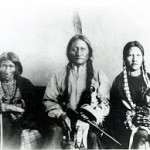 Monday, Oct 12, 2020, the holiday has traditionally been called “Columbus Day”. Join us on Sunday, the 11th, as we honor the Indigenous people who were here long before us.
Monday, Oct 12, 2020, the holiday has traditionally been called “Columbus Day”. Join us on Sunday, the 11th, as we honor the Indigenous people who were here long before us.
As a child, I learned a pledge of allegiance that carried far more than loyalty to “one nation, under God.” I learned allegiance to the assumption that this nation was founded by my European forebears just a few centuries ago. I learned that Columbus “sailed the ocean blue in fourteen hundred nine-two.” I learned to draw the Niña, the Pinta, and the Santa Maria. I learned and memorized the “really important dates”—1492, 1620, 1776, 1789. I didn’t bother asking or wondering or doubting, because I really didn’t have to.
“Every year as October 12 approaches, there is a certain sense of dread that can be felt in indigenous communities in the Americas,” writes Roxanne Dunbar-Ortiz, a historian, writer, and co-founder of the Indigenous World Association, which lobbies the United Nations on behalf of indigenous peoples’ rights. She continues:
“That it is a federal holiday in the United States is regarded as hideous, a celebration of genocide and colonization. However, beginning thirty years ago, indigenous peoples formed an international movement, demanding…that October 12 be commemorated as an international day of mourning for the Indigenous Peoples of the Americas. Informally, the day has been appropriated as Indigenous Peoples Day. This year feels different in indigenous communities as they celebrate the great victory of the adoption of the United Nations Declaration on the Rights of Indigenous Peoples by the General Assembly…”
We are part of this international day of mourning, we are part of this movement. Our NCNC UCC conference is considering a resolution of Amendments, which I encourage you to read HERE.
Those of us whose ancestry is from other shores are newcomers. No matter that our ancestors go back to the 1600s; we’re newcomers. We’ve barely arrived here, already we’ve forgotten why we set sail? Was it an escape from religious oppression? Was it a flight from famine? Was it a quest for gold to feed a hungry queen? Was it a crusade to appease a fragile god? And our arrival?
What is it that we hold sacred? What is it that we celebrate?
In the spirit of the late Alfred Arteaga:
Five hundred and (twenty eight) years of events
took place, we cannot change that.
We cannot stand up like Las Casas
and say this must stop; we cannot
tell Tainos, on first seeing the Spanish arrive,
to run, to run, and not stop running.
What was, was.
We cannot change the number of days, nor
can we change the events that happened.
We can, though, choose to remember or forget,
to celebrate, solemnize, recognize.
May it be so. Amen.

